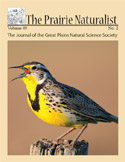Great Plains Natural Science Society

The Prairie Naturalist
Date of this Version
6-2014
Document Type
Article
Citation
The Prairie Naturalist 46:48–49; 2014
Abstract
Diurnal birds of prey are apex predators, which often are utilized as indicators of potential environmental change (Newton 1979, Rodriguez-Estrella et al. 1998). While the Platte River Valley of Nebraska and the central plains are recognized as important winter habitat for numer- ous bird of prey species (United States Fish and Wildlife Service [USFWS] 1981, Root 1988), there are few published studies describing the distribution and abundance of raptors in Nebraska (Mathisen and Mathisen 1968, Craighead and Craighead 1969, USFWS 1981). In addition, studies summarizing the long-term distribution or density of Falconi- formes in Nebraska are limited due to the absence of long- term studies, scarcity of published reports, and low number of raptors identified by Breeding Bird Surveys or Christmas Bird Counts (Johnsgard 2001). Therefore, the objective of my study was to provide additional data on the occurrence and abundance of raptors in Nebraska.
My study area consisted of Buffalo County, Nebraska. The Platte River borders the southern edge of Buffalo County, and the county is approximately 5200 km2 in area. The central Nebraska Loess Plains and Platte River Lowlands are the principle physiographic regions within the study site (Weaver and Bruner 1948). The Nebraska Ornithological Union (NOU 2008) indicated 17 diurnal raptor species on the 2008 Buffalo County checklist of birds, including American kestrel (Falco sparverius), merlin (F. columbar- ius), peregrine falcon (Falco peregrinus), prairie falcon (F. mexicanus), bald eagle (Haliaeetus leucocephalus), golden eagle (Aquila chrysaetos), northern harrier (Circus cyaneus), sharp-shinned hawk (Accipiter striatus), Cooper’s hawk (A. cooperii), broad winged hawk (Buteo platypterus), Swain- son’s hawk (B. swainsoni), red-tailed hawk (B. jamaicensis), ferruginous hawk (B. regalis), rough-legged hawk (B. lago- pus), osprey (Pandion haliaetus), turkey vulture (Cathartes aura) and Mississippi kite (Ictinia mississippiensis).
Included in
Biodiversity Commons, Botany Commons, Ecology and Evolutionary Biology Commons, Natural Resources and Conservation Commons, Systems Biology Commons, Weed Science Commons


Comments
Published by the Great Plains Natural Science Society. Used by permission.